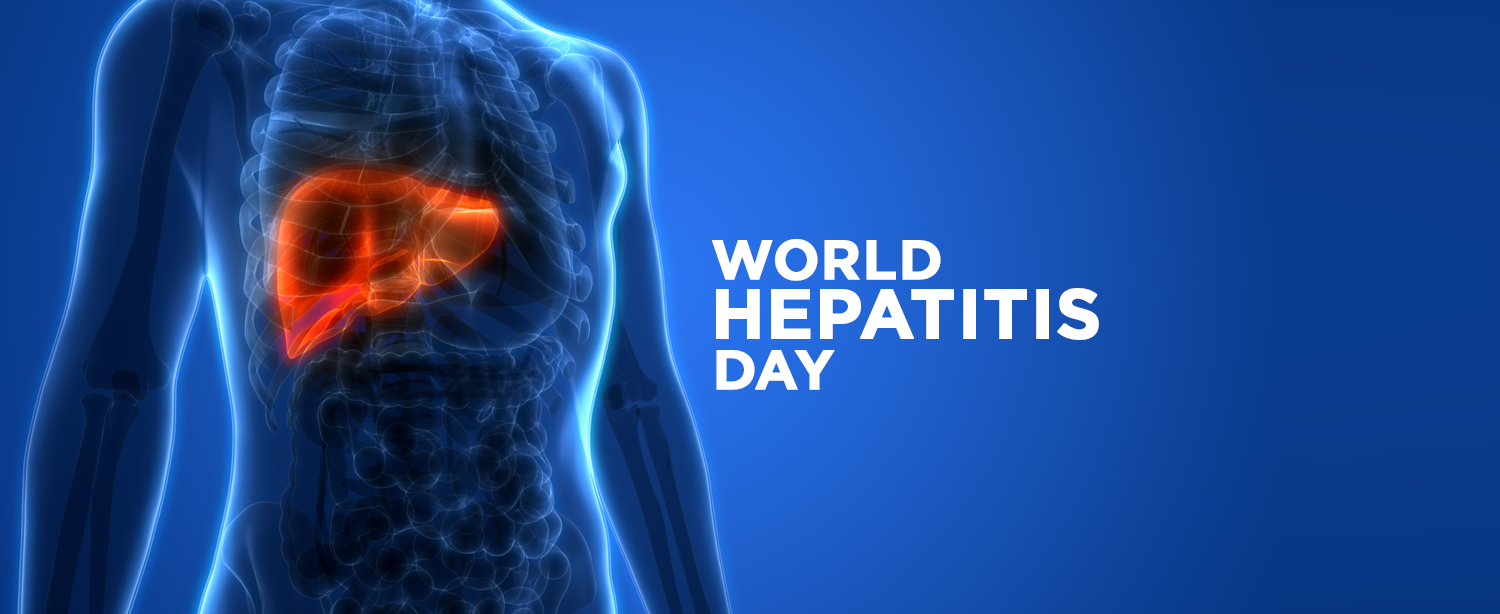28th July is observed as World Hepatitis Day worldwide and sees many international programs which are focussed to spread the awareness of Hepatitis.
What is Hepatitis? Hepatitis is an inflammation of the liver. It may be caused by drugs, alcohol use, or certain medical conditions. But in most cases, it’s caused by a virus. Hepatitis is a common disease that inflames the liver, an important organ for metabolism and breaking down food in the digestive system.
What are the five types of hepatitis?
There are at least five different types of viral hepatitis: A, B, C, D and E.
Hepatitis A
Hepatitis A is spread by either direct contact with an infected person’s faeces or by indirect faecal contamination of food or water.
Symptoms include:
- fever
- dark urine
- light stool
- jaundice
Maintaining utmost hygiene especially before and after meals is a good way to prevent hepatitis A. Take the Hepatitis A vaccination.
Hepatitis B
Hepatitis B virus (HBV) can be spread through:
- body fluids
- urine
- semen
- from mother to infant soon or right after birth
Symptoms can include:
- abdominal pain
- jaundice
- nausea
- vomiting
- fever
- joint pain
A blood test is needed to diagnose HBV, and vaccinations are available to protect people at high risk for infection. Practise safe sex, do not share needles or razors and get tattoos done only at hygienic places.
Hepatitis C
Hepatitis C (HCV) is most commonly spread by exposure due to contaminated blood or needles and unsafe sex.
Symptoms for HCV are similar to other types of hepatitis, and like HBV, a blood test is needed for diagnosis. Both HBV and HCV increase a person’s risk for liver cancer. There’s no vaccine available for Hepatitis C.
Hepatitis D
Unlike the other forms, hepatitis D can’t be contracted on its own. It can only infect people who are already infected with hepatitis B. People with HBV often develop hepatitis D (HDV), which is spread through contaminated blood products and unprotected sex with an infected person. The symptoms remain same as mentioned above.
Hepatitis E
Hepatitis E virus (HEV) is found in underdeveloped areas of the world and is spread by the faecal/oral route. HEV causes acute hepatitis, which usually goes away on its own.
Some preventive measures:
Prevent hepatitis with good hygiene, practicing safe sex, and being careful around anything contaminated with blood. If you experience jaundice, dark urine or light stool, see your doctor right away.
Healthy diet and Hepatitis
What we eat affects our entire body, especially our liver. It is the second largest organ and helps with many vital functions. Your liver is a highly efficient engine and filter. What you eat, drink and expose to your body is chemically broken down by your liver and affects your immune system and many other functions of your body.
Listed below are a few health tips for managing Hepatitis:
- Eat foods from all food groups in healthy portions such as whole grains, lean proteins, low fat dairy, fruits, vegetables and healthy fats.
- Eat foods with high fibre such as fresh fruits, vegetables, lentils, beans and whole grains to keep your liver healthy.
- Limit red meat as it takes longer for your system to break it down.
- Limit foods and drinks that are high in sugar and salt, fatty foods and processed or fried foods.
- Stay within a healthy weight range because the liver can function better.
- Eating smaller meals throughout the day is also better than large meals.
- Drink plenty of purified water to hydrate yourself. Avoid alcohol as it may increase your liver damage.
- Include healthy fats in your diet like olive oil and avoid trans-fats that are highly saturated.
- While soy products have lot of health benefits do not consume them in excessive amounts as they can be harmful for your liver.
- Other foods that constitute a healthy diet for hepatitis patients include nuts, seeds, fish, poultry, tofu, whole milk, yogurt and cheese.
Few facts about Hepatitis:
- Not all forms are related to risky habits – Not all forms of hepatitis are spread through direct exchange of bodily fluids. Of the five different types of hepatitis, some viruses spread through contaminated food or water.
- Most people don’t realize they have it – Sometimes hepatitis can be hard to detect because it starts out with mild, flu-like symptoms including fever, fatigue, and body aches. For some people, it takes years to develop the severe symptoms.
- Contaminated water and food are risky – Hepatitis A and E viruses are transmitted by what’s known as the faecal-oral route: that is, eating food or drinking water that’s been contaminated by the faeces of someone who has the virus.
- Some forms can lead to cancer – Unless treated properly, inflammation from chronic hepatitis can lead to cell damage and, eventually, liver cancer. If there is a family history of liver cancer or your Hepatitis has caused liver cirrhosis, your chances of developing cancer are even greater.
- Drinking alcohol can make it worse – While certain medications can help people manage hepatitis, lifestyle choices can affect how it progresses. In both types B and C, alcohol definitely makes the scarring of the liver worse and progress faster.
- Pregnant women should be tested – The most common cause of hepatitis B transmission globally is mother to infant. Hence pregnant women should be screened for hepatitis B when they receive prenatal care.
Consult our team of liver specialists if you have or suspect Hepatitis. Please find below link for further details:
https://www.kokilabenhospital.com/departments/clinicaldepartments/hepatopancreatobiliary.html
Tags: Healthy diet and Hepatitis, hepatitis, Hepatitis A, Hepatitis B, Hepatitis C, Hepatitis D, Hepatitis E, Hepatitis Facts, World Hepatitis Day


